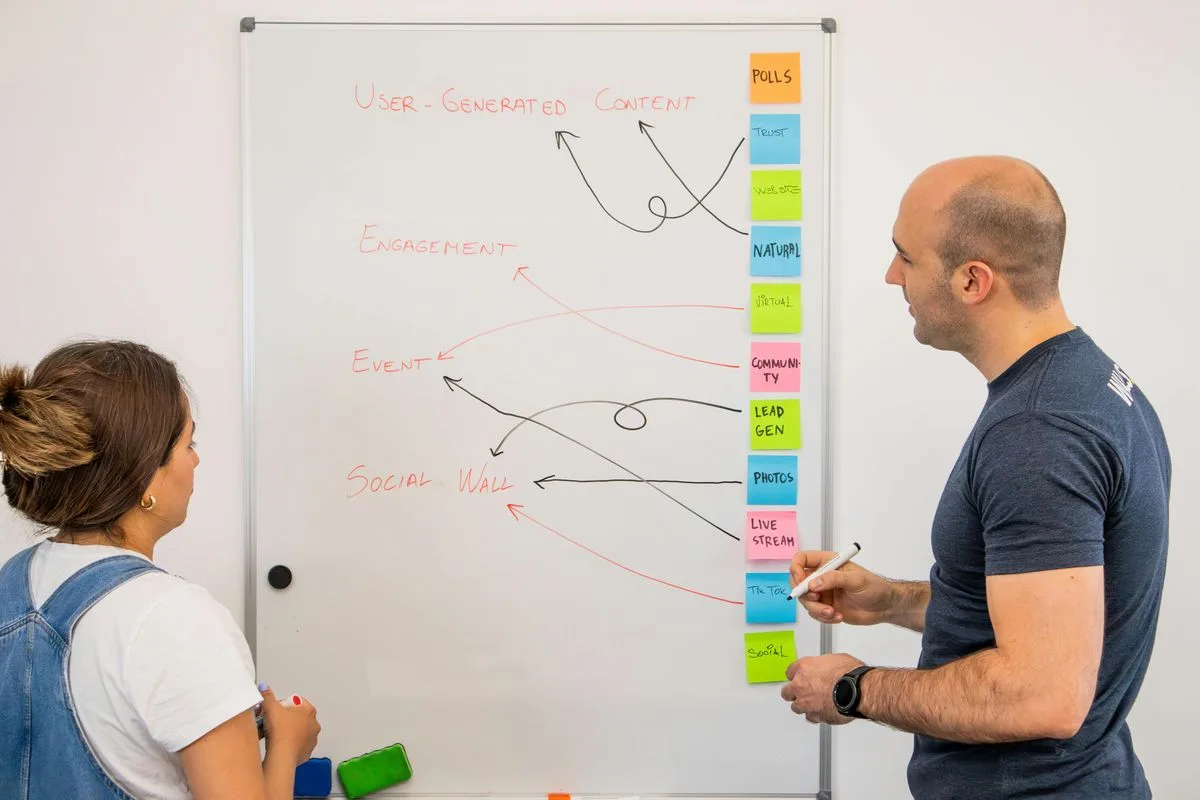Growleady Team
Lead Generation Experts
Legal Guide: Can You Sell Leads? GDPR & FTC Compliance
Explore the legality of selling leads while adhering to GDPR and FTC guidelines, with tips on data protection, consent, and best practices for lead generation and management.

Ever wondered if you can make a buck or two from that list of contacts you've been curating? Selling leads can be a lucrative side hustle or even a full-blown business. But before you dive in, it's crucial to know the legalities. Is selling leads above board, or are you diving into murky waters?
Understanding the do's and don'ts of lead selling is key to keeping your hustle hassle-free. You don't want to be caught off guard by legal issues that could've been avoided. So, let's unpack the rules and regulations together to ensure your lead selling venture is as smooth as a well-oiled machine.
Pros and Cons of Selling Leads

When you're exploring the idea of selling leads, it's like fishing in new waters. You've got to be aware of what's beneath the surface, but also the potential rewards. Let's dive into this together and make sense of all the aspects.
Understanding the Benefits
Lead selling can be lucrative. Like finding a treasure map, each lead is a potential goldmine for businesses hungry for customers. Here's why:
Increased Revenue Stream: Selling leads can add a significant chunk of change to your income. It's like planting a cash crop in your financial garden.
Cost-Effective: Unlike traditional advertising, you're not spending heaps. It's like tapping into a hidden stream rather than awaiting rain for nourishment.
Network Expansion: Sharing leads can mean forging new alliances. Think of it like broadening your social circle with folks who share your interests.
Navigating the Downsides
However, where there's reward, there's often risk. Here's what could go wrong:
Legal Pitfalls: The lead-selling waters can be murky, with regulations like sharks lurking to bite. Ensure you're swimming in safe legal waters.
Quality Expectations: Sometimes, the leads you think are prize catches might just be old boots. Selling poor quality leads tarnishes your reputation – like mud on your shiny shoes.
Market Saturation: If everyone's fishing in the same pond, the fish get spooked, and it's harder to get a good catch. Too many leads can dilute their value.
Avoiding Common Errors
You wouldn't set sail without checking the weather; similarly, avoid these common mistakes in lead selling:
Ignoring Data Privacy Laws: It’s like inviting someone into your home without knocking. Always get consent from leads before passing on their info.
Not Qualifying Leads: Offering leads without ensuring they're a good fit is like serving a steak to a vegetarian. Qualify your leads to ensure they meet your buyer's criteria.
Techniques and Methods
Different seasons call for diverse fishing techniques. Similarly, lead collection methods vary:
Cold Email Outreach: It's the rod and reel of lead generation. Precise, targeted – but requires finesse.
LinkedIn Networking: Casting a net on LinkedIn can yield a bountiful catch due to its professional setting.
Legal Considerations for Selling Leads
When venturing into the world of lead selling, due diligence is your best friend. Imagine you're setting sail in unfamiliar waters; you'll want a map, right? The legal landscape surrounding lead sales can be just as complex, so let's navigate these waters together.
One key point you need to understand is data protection laws. Just as you wouldn't want someone rummaging through your personal mail, individuals and businesses value their privacy. In the US, there's the Controlling the Assault of Non-Solicited Pornography and Marketing (CAN-SPAM) Act for emails, and the General Data Protection Regulation (GDPR) in Europe, which set strict rules about consent and data handling.
Here's a common trap: assuming consent is a one-size-fits-all deal. It's not. You must ensure you have the explicit permission to share someone's info. Failing to do so is like borrowing someone's car without asking—eventually, it'll catch up to you, and it won't be pretty.
Let's talk techniques. Say you're using cold email outreach. You'd better be wearing your Sherlock Holmes hat because you need to play detective and verify that the leads you've collected have opted-in. And in the LinkedIn game, it's not just about adding connections. It's about fostering relationships and confirming that they're comfortable with you passing their details along, like a friend introducing friends at a party.
To avoid barking up the wrong legal tree, integrate best practices:
Create Transparent Opt-in Procedures: Clearly inform potential leads what they're signing up for.
Keep a Paper Trail: Have records that show consent, in case someone asks for proof.
Constantly Review Regulations: Stay updated with laws because they can change as often as your favorite apps get updates.
Diving into lead selling without recognizing the legalities is like skipping the tutorial in a complex video game—you'll likely miss critical steps and face unnecessary challenges. Equip yourself with knowledge, and you’ll find navigating the legalities of lead selling can be a straightforward journey.
Data Protection Laws and Privacy Regulations

When you're diving into the world of lead selling, think of data protection laws as the guardrails keeping your business on the road to success. Navigating these laws can be like learning to ride a bike for the first time; it might seem daunting, but once you get the hang of it, it becomes second nature.
One common mistake is to underestimate the global reach of laws like the GDPR. Even if your business is based in the US, if you're reaching out to leads in Europe, GDPR compliance isn't just nice to have; it's a must. Remember, ignorance isn't bliss, it's a risk you don't want to take.
You might be more familiar with the CAN-SPAM Act when dealing with cold emailing. This act is like the etiquette guide for email marketing; it tells you how to politely knock on someone's digital door without being invasive. It states that you must include an unsubscribe link in your emails and never use misleading header information.
Practical tips to stay compliant include:
Always obtaining explicit consent before adding someone to your mailing list.
Keeping detailed records of where and how you obtained your leads.
Making sure your opt-out process is as clear and straightforward as possible.
When it comes to LinkedIn outreach, the platform has its own set of rules. Think of LinkedIn as a private club and their rules as the club's dress code. To access its members (leads), you must adhere to the platform's policies, avoiding any actions that could be seen as spammy or unprofessional.
As for techniques, let's dissect cold emailing a bit more. It's all about personalization. You wouldn't gift the same birthday present to every friend, right? Similarly, your leads are unique, and your initial email should be tailored to their specific needs or interests.
Incorporating these practices means you're not just blindly reaching out but strategically connecting. You might want to:
Use email tracking tools to understand who's engaging.
A/B test your email copy to see what resonates.
Segment your email list to ensure relevance.
Remember, whether you're working the room at a networking event or sending out emails, the principles are the same – be engaging, respectful, and provide value. That’s how you turn cold leads into warm conversations.
Compliance with GDPR
Navigating data protection regulations can feel like you're trying to solve a Rubik's Cube—complex and multi-dimensional. But when it comes to the GDPR, think of it as a traffic light system for the processing of personal data—you need to stop, look, and proceed with caution to avoid costly tickets, or in this case, fines.
Obtaining Consent
The GDPR mandates that you get explicit consent before you process personal data. Imagine you're asking a neighbor if you can borrow their lawnmower—it's not enough to assume they'd say yes; you've got to ask first. Similarly, when selling leads, you need a clear yes from the individuals whose information you're handling.
Data Minimization Principle
You're at a buffet, but instead of piling your plate with everything, you take only what you'll eat. That's data minimization. Collect only the data necessary for your purpose and nothing more. You avoid waste and respect privacy, both of which the GDPR values highly.
Right to Be Forgotten
Ever wished you could erase an embarrassing photo from the internet? That's the essence of the GDPR's right to be forgotten. Individuals can request that their data be deleted, and you must comply promptly. It's as if someone wants their number off the bathroom wall—it’s only fair to respect that wish.
Record-Keeping
Documentation is your best friend under the GDPR. Keep records like you’re tracking expenses for a tax audit. If authorities ask, you’ll have everything in order to prove that you've been playing by the rules.
Data Protection Officer (DPO)
If handling leads is your main business, appointing a DPO is like having a dedicated quarterback for your data protection strategy. This person oversees compliance and is a point of contact between your organization and data protection authorities.
Remember, GDPR isn't just a hurdle; it’s about fostering trust. If customers know you're handling their data responsibly, they're more likely to see you as reliable, boosting your reputation and their willingness to do business with you. So, learn the plays, abide by the rules, and keep your data game clean and commendable.
FTC Guidelines for Lead Generation
When you dive into the world of lead generation, think of the Federal Trade Commission (FTC) guidelines as your trusty road map. Just like you wouldn't hit the road without GPS, you don’t want to start selling leads without a clear understanding of what’s legal.
Understanding the Basic Rules
Imagine the FTC guidelines as traffic signals for lead generation. Red means stop: you can’t use deceptive practices. Green means go: fair and clear practices are your green light. And the yellow light? That's where you have to be careful—ensure that any claims you make about your leads are truthful and supported by solid evidence.
Avoiding Common Pitfalls
Some folks think the more aggressive the sales tactic, the better the results. But that's like flooring it in a school zone—it's risky and could lead to a big fine. So, when reaching out to potential leads, especially through methods like cold emailing or LinkedIn outreach, always get consent and be transparent about who you are and what you’re offering.
Tailoring Your Approach
There are as many ways to generate leads as there are fish in the sea. It's crucial to tailor your approach to the specific type of lead you're after. For instance, engaging with professionals on LinkedIn might require a different tactic than reaching out to potential customers via email. Think of it like fishing: you wouldn't use the same bait and techniques for catching a salmon as you would for a trout.
Best Practices in Lead Generation
Imagine nurturing leads is like growing a garden. You don't just plant seeds and walk away. You water them, give them sunlight, and protect them from weeds. Similarly, once you've got your leads, engage with them regularly, provide valuable information, and build a relationship. That's your sunlight and water. Keep a check on your tactics and prune away any that don't comply with the FTC guidelines—that’s your weed removal.
Incorporating these FTC guidelines into your lead generation strategies isn't just about staying within the legal lines—it's also about enhancing your reputation and building trust with your audience. By being clear, honest, and responsible in your outreach efforts, you set yourself up for long-term success in the lead generation arena.
Best Practices for Selling Leads
When you're in the business of selling leads, think of yourself as a matchmaker in the digital world. Your goal is to align the needs of a business with the solution provider who can fulfill those needs. Just like in dating, first impressions are crucial, and transparency is key.
One common mistake is to assume all leads are created equal, which is like saying all dates are suited for marriage. Just as you'd look for certain qualities in a partner, businesses should seek out leads that are the right fit. That means ensuring leads are qualified and have shown an interest in the product or service you're promoting. To avoid the pitfall of poor-quality leads, focus on:
Lead Segmentation
Proper Qualification
Clear Communication
With lead segmentation, you're grouping leads based on specific factors like demographics, buyer behavior, or engagement levels. Imagine sorting your wardrobe—you wouldn’t mix your gym clothes with your business suits, right? Each segment needs a different approach, just like different occasions call for different outfits.
Proper qualification of leads is akin to checking off a list of must-haves before committing to a relationship. It involves asking the right questions to ensure that there's potential for a meaningful connection. Think of it as screening before a blind date; you wouldn't set up two people without knowing they have something in common.
Clear communication is all about setting the right expectations. If you're selling a lead, be honest about what that lead knows and expects. It’s like telling a friend you've got someone for them to meet—you'd give them an accurate description rather than let them walk in blind.
Here are different techniques you could utilise:
Inbound Marketing: Like a magnet, attract leads by providing valuable content and information. This could mean SEO-optimized blog posts, informative webinars, or even helpful e-books.
Cold Email Outreach: Think of it as knocking on someone's door. It's a direct approach, but it should be personalized and not pushy.
LinkedIn Outreach: Similar to attending a networking event, you're making connections, initiating conversations, and providing value before you ever ask for anything in return.
Conclusion
Navigating the complexities of lead selling legally requires your keen attention to data protection laws and a commitment to ethical practices. By ensuring you're obtaining explicit consent and adhering to data minimization principles, you're not only complying with regulations like GDPR but also establishing a foundation of trust with your customers. Appointing a DPO and incorporating FTC guidelines into your strategy will further safeguard your operations and reputation. Remember, it's not just about being compliant; it's about being conscientious of the leads you handle. Employing best practices, such as lead segmentation and clear communication, will not only keep you within legal boundaries but also enhance your lead generation and selling strategies. Stay informed, stay ethical, and your lead selling efforts will pay off while maintaining the integrity of your business.
Frequently Asked Questions
What is GDPR?
The General Data Protection Regulation (GDPR) is a legal framework set by the European Union to protect privacy and personal data of individuals within the EU and EEA. It mandates obtaining explicit consent for processing personal data and upholds principles like data minimization and the right to be forgotten.
Why is data minimization important?
Data minimization is important as it limits the collection of personal data to what is strictly necessary for specified purposes. This practice reduces the risk of data breaches and increases trust with customers, ensuring compliance with data protection laws like GDPR.
What is the right to be forgotten?
The right to be forgotten allows individuals to request the deletion of their personal data from an organization's records, provided there are no legitimate grounds for retaining it. It is a fundamental right under the GDPR.
Why should a company appoint a Data Protection Officer (DPO)?
Appointing a DPO is crucial for monitoring and ensuring compliance with data protection laws. The DPO advises on, and oversees, GDPR compliance and acts as a point of contact for data subjects and regulatory bodies.
What are the FTC guidelines for lead generation?
The Federal Trade Commission (FTC) guidelines for lead generation outline the basic rules for legally and ethically collecting and selling leads. They address the necessity to avoid deception, ensuring clear and honest communication with potential leads to foster trust and maintain reputation.
How can lead segmentation improve lead selling?
Lead segmentation allows businesses to categorize their leads based on specific characteristics and behaviors. This targeted approach leads to better qualification of potential customers, more personalized communication, and, ultimately, improved sales conversion rates.
What are some effective lead generation techniques?
Effective lead generation techniques include inbound marketing to attract prospects, cold email outreach for direct engagement, and LinkedIn outreach, which leverages professional networking for targeted lead discovery and connection.


